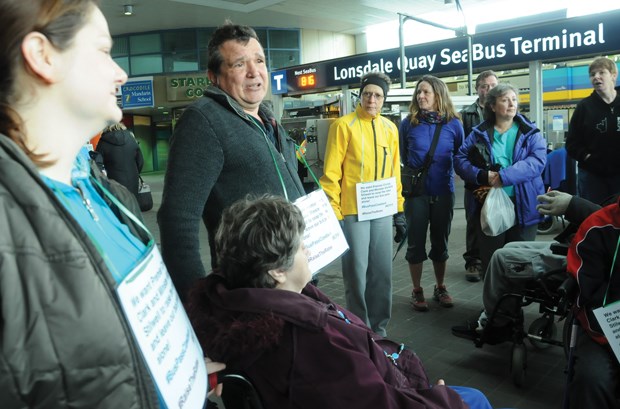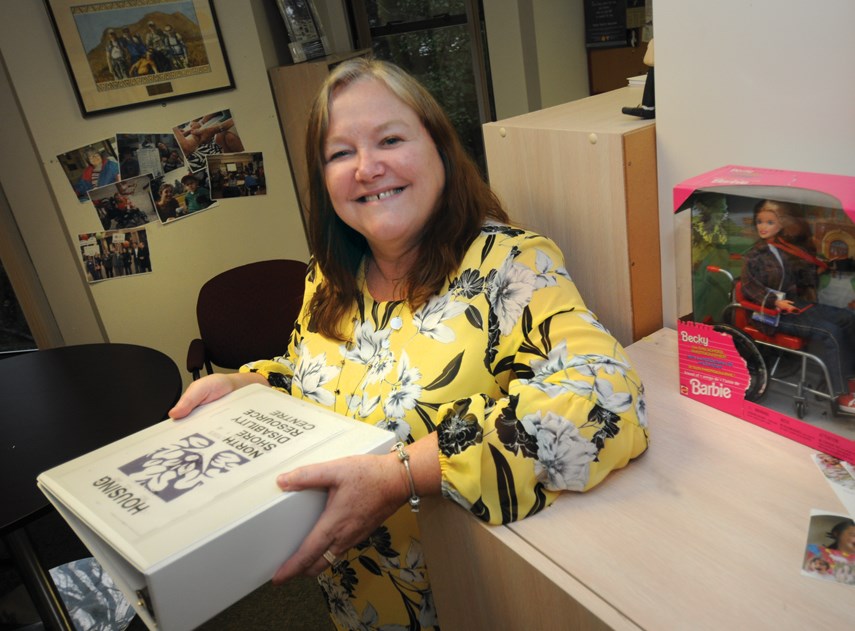They kicked the boy out of the pool.
The child was eight years old, autistic and largely mute.
Worse things had happened to him, Liz Barnett knew. She’d learned about his life in the foster system and the traumas he’d suffered.
Excluding people with disabilities was commonplace in the 1980s. But as a then-teenaged advocate, Barnett wasn’t prepared for staff at a North Vancouver swimming pool feeling justified, even obligated, to tell a little boy to get out.
“It really made me angry, is what it did,” Barnett says. “Now I would hope my staff would say: ‘Have you read your human rights lately?’ or something nicer than that,” she adds with a laugh. But back then, she says, she didn’t know how to stand up for herself or what to do with her anger.
The managers at North Shore Disability Resource Centre helped her focus that anger on being effective advocate.
Effective advocacy, Barnett says, is “honey and vinegar.”
For 30 years she’s used both – although much more honey – lobbying on behalf of North Shore residents and against the barriers that still exclude people with disabilities. But after 17 years as NSDRC director, Barnett has worked her way out of a job, she says.
On Jan. 20 Barnett is set to step down from the NSDRC, bidding farewell to colleagues, clients and bridge traffic. Rather than a tranquil retirement, however, she’s planning to take her experience and enthusiasm to Indigenous youth in Vancouver’s Downtown Eastside.
“I wouldn’t mind taking a run at that rock,” she says.
“I go down to Main and Hastings and I just cannot believe that, this province and this country, that this is where we’ve ended up,” she says. “I didn’t want to sit at (age) 60 and think: ‘What could I have done?’”
That question: ‘What could I have done?’ has motivated Barnett since she began tilting at the easy acceptance of wanton discrimination. She has explained, over and over again, that people with disabilities are not “those people.”
“It’s about your neighbour or your cousin or somebody that you know,” she says.
An ineffective advocate has a tendency to be too quick to draw a line in the sand. But on occasion, Barnett explains, discussing the “bus pass fiasco,” drawing that line is part of the job.
In 2016, Barnett was part of a rally at North Vancouver’s SeaBus terminal protesting the provincial government’s plan to deduct the cost of transit passes from increases to disability pensions.

The provincial budget had heralded an extra $77 per month for people living on a disability pension. But by eliminating a free transit pass, the net increase dropped to about $25. Eventually, a compromise was reached where about half of B.C. residents on disability would get the full increase.
It was an incident where “poorly thought out policy” was harming people subsisting on social assistance rates that had been frozen for many years, according to Barnett.
“They don’t want to be in poverty,” she said at the time.
The protest over the bus pass clawback was in part about the freedom of mobility. For almost her entire career on the North Shore, Barnett has been working against discrimination by omission. The old Lynn Valley Road wasn’t engineered to be impassable for people with mobility challenges, but it wasn’t engineered or maintained with them in mind, either.
“We couldn’t get anywhere,” she says, discussing that road and the move toward increased accessibility at libraries, rec centres, and other public spaces.
But while she’s seen improvements in the public sphere, accessible housing remains in short supply, she says. That shortage is causing many people with disabilities to live in “very poor conditions.”
In the future, Barnett hopes to see a North Shore-wise conversation targeting housing for workers in lower tax brackets.
Her employees can’t afford to pay rent on the North Shore, she says. And when they get to the North Shore there’s still a challenge in finding meeting places.
“The church basement days . . . they’re not even available anymore,” she says. “Government doesn’t want to pay for any overhead so organizations are gradually being pushed out.”
NSDRC has recently been sharing a meeting room with a speech therapist who can’t find space on the North Shore.
But while infrastructure is slow to change, attitudes have altered.
“Nobody’s going to kick a person with a disability off of a bus anymore, I don’t think,” she offers. “The bigger issue right now is transit being accessible . . . because (buses) aren’t running very often or they’re full.”
There’s still discrimination toward people with disabilities, Barnett says, but it’s “a more subtle prejudice” conveyed in facial expressions and seemingly innocuous comments.
“It’s a much different world three decades later than it was when I started,” she says.
Originally from New Brunswick, Barnett grew up feeling she had a dearth of options.
“Back there you’re either married or going to the army,” she says.
Barnett’s mother, she says, “thought I was a bit of a hellion,” and, shortly after the family moved to B.C., recommended her daughter get a job at McDonald’s.
Instead, the Carson Graham student started volunteering. She had a Peace Corps mentality, she says.
“The world isn’t right let’s make it different and better,” she says.
Nursing an ambition to be a childcare worker, Barnett came to NSDRC to help children – some of whom had complex disabilities – to learn skills that would them connect with their community, she says.
The notion that things could be different, could be fair, has kept her moving and motivated.
“I always had a thing for social justice,” she says. “I’ve got a big mouth and a big heart.”
The NSDRC board of directors appointed Kathleen Jessop as an interim executive director while searching for a replacement for Barnett.



